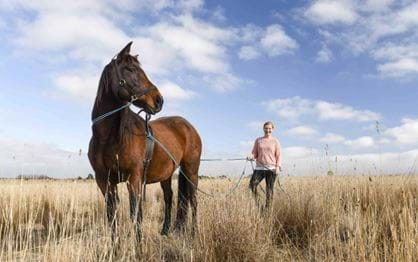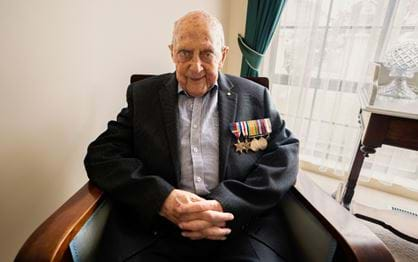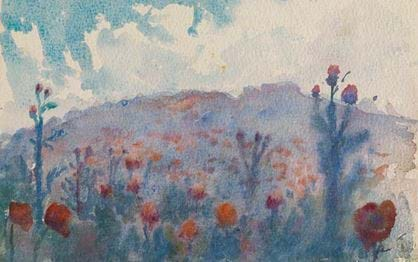Born in Victoria’s Western District where his father Charles was Chairman of Hamilton Racing Club for 25 years, Peter Armytage joined the RAAF shortly before his 19th birthday. A year later he had embarked from Melbourne to serve with the RAF in Britain, with the commissioned rank of Flying Officer.
As a wireless operator he flew on four bombing missions to Germany in early 1944. On the night of 24 March 1944 on a mission to Berlin his Lancaster aircraft with a crew of seven was hit by flak and set on fire over Germany near the Dutch border. At 10,000 feet altitude, all crew evacuated the stricken aircraft and parachuted to safety.
Peter Armytage evaded capture by running eighteen miles and swimming an icy river into Holland, then under German occupation. For the next six weeks, with the aid of the Dutch underground and sympathetic families, he remained free. His story has been well told on the website;
https://www.1wags.org.au/information/featured-stories/flight-lieutenant-peter-armytage/
‘He was given civilian clothes and a bicycle. His passport stated that he was a deaf and dumb electrician. Peter was moved between families with the intention to escape over the Pyrenees mountains to Spain. He was to write about the kindness and generosity of these Dutch families who took enormous risks in hiding Allied airmen.’
‘After hiding with a family in Eindhoven. Peter was moved to a village called Erp. Here he stayed with the Mayor, Harry Otten. During the war he hid 56 airmen in total often in buildings with false walls.’
‘Eventually Peter was moved by train to the Belgium-Dutch border and then by bicycle to Antwerp. It was here that Peter was betrayed to the Gestapo. He spent two months in the Antwerp jail being interrogated on a regular basis.’
Peter Armytage had been reported missing in action after his plane was shot down in March. Not until August 1944 did his family in Australia learn that he was now a prisoner of war with the Germans.
His official RAAF file records that after a month at Antwerp he spent the best part of the next year at the Luftwaffe-run POW camps, notably Stalag Luft III in lower Silesia (now part of Poland). His arrival there was after the ill-fated but famed ‘Great Escape’. During his time at Stalag Luft III he was formally promoted to the rank of Flight-Lieutenant. Tough conditions in the camp deteriorated as the war dragged on into 1945.
‘With the Russians advancing, the Germans marched the POWs from Stalag Luft 111 eighty miles over four days through thick snow to avoid falling into Russian hands. Peter and the other POWs were marched to Buchenwald, forty or fifty miles west of Berlin. It was obvious to Peter that Buchenwald was a concentration camp where Russians and Jews were being murdered in gas chambers. The Russians eventually liberated the camp.’
This was on 22 April. By June, Peter Armytage was in Britain, and he returned to civilian life in Australia, marrying Diana Officer in 1946.
Always there was an interest in racing. Peter served on the committee of the famous Dunkeld Racing Club and became Chairman of the Hamilton Racing Club and the larger South Western District Racing Association. In 1978 he was elected to the Committee of the VRC, becoming Vice Chairman in 1983 and Chairman in 1986.
Rod Johnson as VRC Secretary worked closely with Peter Armytage and credits him with many significant reforms as Chairman in challenging times, always a strong supporter of country racing. His down-to-earth, unpretentious personality won him friends and allies everywhere. In 1991 he was awarded the AM (Member of the Order of Australia) for his services to racing. He remained on the VRC Committee until retiring in 1993.
Among Peter Armytage’s privileges in his time on the VRC Committee was, as Vice Chairman, to assist in hosting the visit of the Prince and Princess of Wales, Charles and Diana, to the 1985 Melbourne Cup. As Chairman, he hosted the 1988 visit by Queen Beatrix of the Netherlands. Recalling the courage and human kindness extended to him by the Dutch in those six weeks of 1944, that royal visit by the Dutch queen carried special resonance for him.



